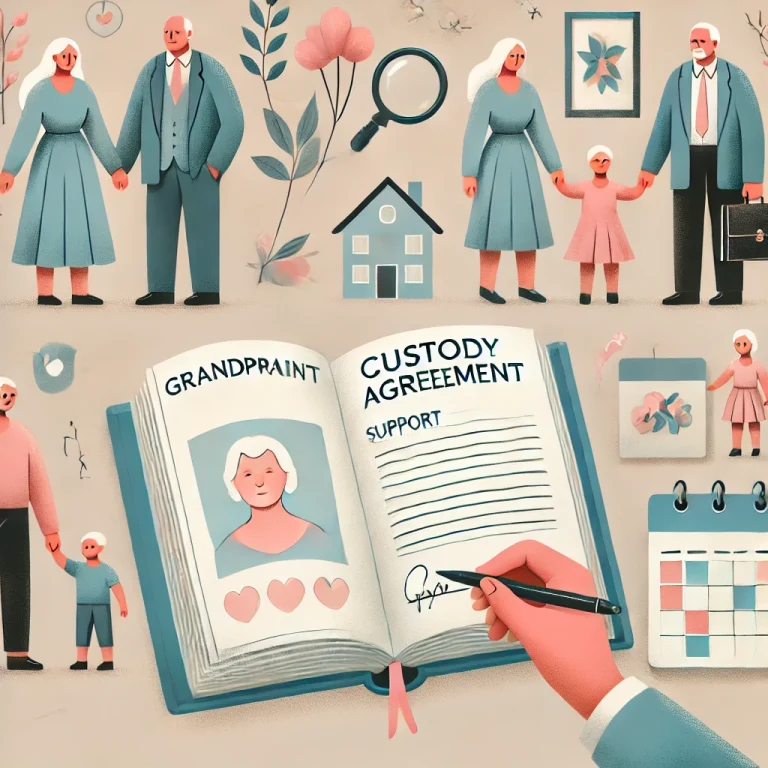Custody arrangements for grandparents | The court accepted an appeal by the parents of a father who murdered his wife, acquitting them of custody of the minor children. The court ruled that the welfare and will of the minors, as presented by them, are decisive. The best interests of the child should not be examined in the light of considerations of reward and punishment. The only consideration to consider is the well-being of the minors, whether in relation to the past or in the future. The minors became orphans from their mother because their father murdered her and he is imprisoned for life. The question is where the children will live and who will receive custody: whether with the grandparents on the part of the deceased mother, whether with the parents of the imprisoned father or with the boarding school.

A family court listened to the experts, heard the minors, examined evidence, and ruled that the solution was to find a boarding school or children’s institute that would meet the minors’ needs. In 2008, after various proceedings between the grandparents on both sides, mainly regarding the relationship arrangements, the appellants (the paternal grandparents) filed a claim for the return of custody of the minors next to them. In their lawsuit, it was alleged that the grandparents (on the mother’s side) do not provide proper care to the minors and treat them harshly. The lawsuit also included a request to address the will of the minors, which the appellants argued should be given decisive weight in the matter.
Examining the opinion of the expert on behalf of the court, as submitted to the trial court, it can be seen that despite the problems in the mother’s parents’ home, he still believes that their psychological atmosphere is healthier than in the father’s parents’ home, which continues to instill false hope related to the father in their hearts. Thus not allowing them to digest and process the reality according to which it was their father who murdered their mother. With regard to these, the expert expressed his opinion that it was in the best interest of the minors to stay with the respondents.
The principle that should guide the decision is the principle of the best interests of the child. With the erosion of the paternalistic approach and the recognition of the right to human dignity as a constitutional right, the emphasis shifted from the principle of “the best interests of the child” to that of “the rights of the child.” The “child rights” model, which aims to replace the “child welfare” model, expresses the recognition that the child is an autonomous creature with independent rights and interests. A key tier in the change in the perception of the child’s well-being concerns the status of the child’s will in it. So if in the past, the will of the child is not always considered as a factor out of all the factors that should be considered in formulating the conclusion that concerns him, according to the “child rights” model, the will of the child is a significant and central factor in the decision. A consequence of this is the child’s right to express himself before making decisions concerning his case.
This resolute desire must be given considerable weight in the issue of custody. Even if its roots are in some incitement, which has not been proven and even more so, even denied by the minors, we should not examine the best interests of the child in the mirror of considerations of reward and punishment. The only consideration that needs to be taken into account is the well-being of the minors, whether with regard to the past or with regard to the future.
Despite the fact that the professional entities who gave their opinions in the various courts in this case, recommended placing the minors with their maternal grandparents or alternatively in an out-of-home placement, the court stated that in these circumstances, this was inconsistent with the extended long-term well-being of the children.

Therefore, the court, emphasizing the best interests of the minors, ruled that custody would be granted to the father’s parents. The minors will study in school in Jerusalem, and grandparents on both sides will be able to make open contact with them without restrictions. The minors will be at the mother’s parents’ house every second weekend. During the holidays, the minors will stay with the mother’s parents and father’s parents alternately.
In 1962, the Legal Qualifications and Guardianship Act was enacted to establish residency arrangements between grandparents and their grandchildren. These stay arrangements are determined in cases of the death God forbid of the son or daughter and stay arrangements are essential for maintaining the desired bond between the grandchildren and their grandparents.
When one of the parents dies, sometimes the living parent does not maintain the relationship of the children with the parents-in-law and even tries to cut off the grandchildren from their grandparents. In addition to the heartache of grandparents due to the death of their child in mid-life, grandparents are added to the suffering of distancing themselves from their beloved grandchildren.
The grandchildren are the only memory grandparents have of their son or daughter. So in addition to the intense love that grandparents have for their grandchildren, they feel a deep emotional connection to the grandchildren. Sometimes, the other spouse does not want his children to stay in touch with the grandparents for reasons such as: lack of affection for them, desire to break away and start a new life, fear of interfering in the children’s lives in terms of education, health and more. Feelings of revenge due to precipitation from the past, etc. The law tries to prevent this difficult situation and enforce stay arrangements between grandchildren and grandparents.
Other cases in which it has been determined that stay arrangements (not joint custody) should be enforced between the grandchildren and their grandparents, are when the parent disconnect himself from his children. The disconnection can result from a parent who is in a state of unconsciousness or a medical event that impairs his or her functional ability. Other cases are when a parent is absent for a long time due to imprisonment or some other reason. Additional cases are when the parent is considered incapacitated and cannot hold on to his or her children. There are also parents who choose to ignore their children and sever all contact with them.
Residence arrangements between the grandchildren and their grandparents are determined not only for the sake of the grandparents but also out of considerations of the best interests of the child. It is extremely important that the child maintains ties with his extended family and especially with grandparents. A child who is in a relationship with only one parent needs a lot of emotional support and to be surrounded by those close to him. The child needs a sense of security, pampering and love provided by the grandparents and they contribute to his emotional development. The child’s right to be in close relationships with the grandparents on both sides and not just with those of the parent with whom the child lives. In cases where the parents are alive and functioning, there is no need to go to court because the other parent makes sure that his children are in continuous contact with his parents.
How can grandparents set up stay arrangements with their grandchildren? The grandparents should contact an experienced family law attorney who will file a lawsuit regarding visitation arrangements. The court will appoint a professional who will examine the situation and submit a report regarding stay arrangements between the grandparents and their grandchildren. A lawyer who is skilled and knowledgeable in legislation will instruct the grandparents how to proceed before the court and fulfill their dream of determining stay arrangements.
Menachem Begin Road 144, 30th floor Tel Aviv, Midtown Tower.
0972-50-4095009
We use cookies to improve your experience on our site. By using our site, you consent to cookies.
Websites store cookies to enhance functionality and personalise your experience. You can manage your preferences, but blocking some cookies may impact site performance and services.
Essential cookies enable basic functions and are necessary for the proper function of the website.